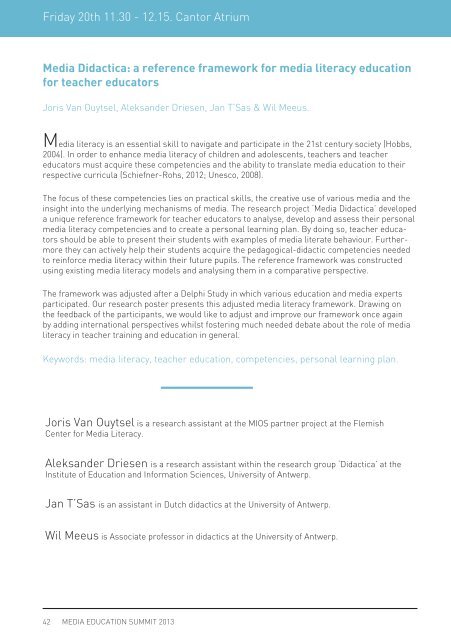2013 Summit Programme - The Centre for Excellence in Media ...
2013 Summit Programme - The Centre for Excellence in Media ...
2013 Summit Programme - The Centre for Excellence in Media ...
Create successful ePaper yourself
Turn your PDF publications into a flip-book with our unique Google optimized e-Paper software.
Friday 20th 11.30 - 12.15. Cantor Atrium<br />
<strong>Media</strong> Didactica: a reference framework <strong>for</strong> media literacy education<br />
<strong>for</strong> teacher educators<br />
Joris Van Ouytsel, Aleksander Driesen, Jan T’Sas & Wil Meeus.<br />
<strong>Media</strong> literacy is an essential skill to navigate and participate <strong>in</strong> the 21st century society (Hobbs,<br />
2004). In order to enhance media literacy of children and adolescents, teachers and teacher<br />
educators must acquire these competencies and the ability to translate media education to their<br />
respective curricula (Schiefner-Rohs, 2012; Unesco, 2008).<br />
<strong>The</strong> focus of these competencies lies on practical skills, the creative use of various media and the<br />
<strong>in</strong>sight <strong>in</strong>to the underly<strong>in</strong>g mechanisms of media. <strong>The</strong> research project ‘<strong>Media</strong> Didactica’ developed<br />
a unique reference framework <strong>for</strong> teacher educators to analyse, develop and assess their personal<br />
media literacy competencies and to create a personal learn<strong>in</strong>g plan. By do<strong>in</strong>g so, teacher educators<br />
should be able to present their students with examples of media literate behaviour. Furthermore<br />
they can actively help their students acquire the pedagogical-didactic competencies needed<br />
to re<strong>in</strong><strong>for</strong>ce media literacy with<strong>in</strong> their future pupils. <strong>The</strong> reference framework was constructed<br />
us<strong>in</strong>g exist<strong>in</strong>g media literacy models and analys<strong>in</strong>g them <strong>in</strong> a comparative perspective.<br />
<strong>The</strong> framework was adjusted after a Delphi Study <strong>in</strong> which various education and media experts<br />
participated. Our research poster presents this adjusted media literacy framework. Draw<strong>in</strong>g on<br />
the feedback of the participants, we would like to adjust and improve our framework once aga<strong>in</strong><br />
by add<strong>in</strong>g <strong>in</strong>ternational perspectives whilst foster<strong>in</strong>g much needed debate about the role of media<br />
literacy <strong>in</strong> teacher tra<strong>in</strong><strong>in</strong>g and education <strong>in</strong> general.<br />
Keywords: media literacy, teacher education, competencies, personal learn<strong>in</strong>g plan.<br />
Joris Van Ouytsel is a research assistant at the MIOS partner project at the Flemish<br />
Center <strong>for</strong> <strong>Media</strong> Literacy.<br />
Aleksander Driesen is a research assistant with<strong>in</strong> the research group ‘Didactica’ at the<br />
Institute of Education and In<strong>for</strong>mation Sciences, University of Antwerp.<br />
Jan T’Sas is an assistant <strong>in</strong> Dutch didactics at the University of Antwerp.<br />
Wil Meeus is Associate professor <strong>in</strong> didactics at the University of Antwerp.<br />
42 <strong>Media</strong> Education <strong>Summit</strong> <strong>2013</strong>


